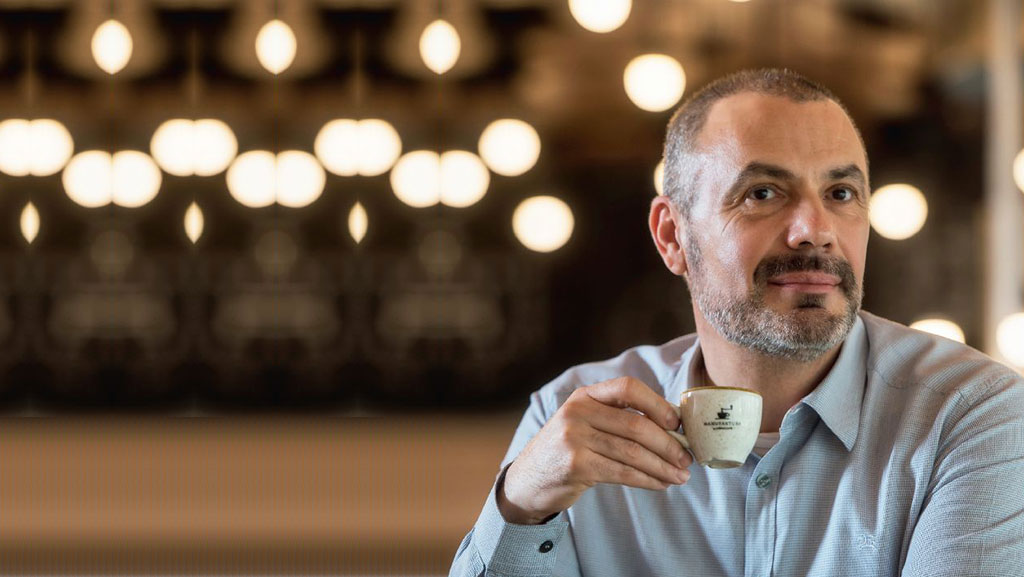Q: Company leaders like yourself have to be aware that everything is changing, to adapt behaviors and organizational cultures and continuously innovate. How do you do this?
Marius Melesteu: We are indeed living in an era where change is part of our everyday lives. We can’t afford to lag behind, because moving forward is what keeps us alive as an organization.
At this point, I think everything begins with yourself as a leader: with adopting a mindset that enables you to embrace change and spot the opportunities it brings. I view this as one of the most important qualities a leader must have, in order to inspire change in others. People can’t be - and should not be - forced to change, but rather inspired to understand how the world changes around them and choose whether they want to be on board or not.
Q: In your view, what is the impact of technological changes on businesses, customers and administration?
Technological innovations are shifting everything around us – from what we eat and how we go to sleep at night – to the jobs our children will have in a decade or so – which will be, I’m sure, nothing any of us can imagine at this point. For an industry such as ours, the changes in technology echo in every branch of activity – from the smallest details – such as shifting administrative processes off of paper – to important factors – such as job automation, which means a job that was until now performed by a person, will be performed by a machine from now on.
As more and more intelligent technologies emerge, the tech savvy businesses will rise to the top, redefining competition and making it all the more difficult to survive for the organizations that are less inclined to embrace change.
Q: Do you see anything specific for Romania related to or about decoding the Industrial Revolution 4.0?
Marius Melesteu: I think we are a very easily adaptable nation. We fast forwarded through some stages – such as adopting the optical fiber or the unusual data speeds compared to other countries. It will be easier for us to adapt, because change is something usual for us, it’s happening every day.
As a general rule, there is room for improvements, businesses didn’t have the time to be optimized yet, so this is an ongoing process which also absorbs change patterns.
However, one thing is certain: the companies that have not been preoccupied by this subject will almost certainly confront non-traditional competitors, whose strategy is disruption through technology. We all know who will win from this.
Q: How do you adapt your business strategies and what’s the impact of the new technologies on your company and on yourself?
Marius Melesteu: As a company, Strauss has already set focus on developing new sales and communications channels, some of them unusual for a coffee producer – like own e-commerce segment with BeanZ Café (www.beanzcafe.ro) and Doncafe Fresh (www.doncafefresh.ro) , but also on strengthening and diversifying existent ones like extending the Manufaktura coffee chain. We also launched new brands for our consumers – some of them innovations for the Romanian market. At the beginning of last year, we launched BeanZ, a young, ambitious brand, aimed at active people – with quality coffee directly from farmers. We also innovated with Doncafe Green Active – with green coffee extract and an increased level of natural antioxidants, but also with Amigo Fusion - a freeze dried coffee with roasted and ground coffee flavors. In theory, the impact of the new technologies on our company will be major: the creation of “smart” factories and production lines, on-demand, custom production capabilities, together with switching the core activity of the company from manufacturing simple products to providing complex, valuable services connected to those products.
Personally, I think that first of all, every organization should help its employees through this process, by making sure everyone becomes aware and prepared for the changes the new technologies imply. This is where the company policies must act in the benefit of the employee, through training sessions, specializations etc. I don’t believe in the theory that machines are going to take over, but rather that people are simply going to concentrate on the bigger picture rather than the details or repetitive choirs - which will make the whole process more efficient.
One of the consequences of the new technologies is, of course, decreased need for human labor; however, this will create an increased need for technical workers who understand how to design, embed and program chips, and monitor and optimize connected machinery and parts. Also, part of the Industrial Revolution 4.0 means that you now have automated access to real time information about stocks, sales etc., without using human labor. The human expertise is, however, needed to interpret this data and benefit from improved decision making.
Also, our improved ability to gather information about our customers helps us better understand and deliver what customers actually want: real time behavioral insights lead to tailored products and services in real time.
The conclusion is that, as long as everyone is aware of the change patterns and the company management sees the integration of the new technologies as a top priority – everyone will only benefit from all this.
Q: In your industry where does the artificial intelligence stands right now and how do you see using it in the future?
Marius Melesteu: I think that, as a company, if you avoid embracing the digital revolution that is happening right now, you stand great risk of falling behind, because your company will no longer be competitive. Once you embark on this journey - driving institutional change, you will see that it works for you and your employees, not against you.
Personally, I have always been open to changes, open to innovation – even though, most of the time, this philosophy comes with risks.
Through all this, we should not forget that, as great as the new features and possibilities might be, they will be nothing without capable, professional people. This is why our employees remain at the core of our business, no matter how many jobs robots will be able to take over in the future.
Q: How Artificial Intelligence could revolutionize the coffee environment?
Marius Melesteu: AI will revolutionize the coffee environment just as it will revolutionize all the other areas. From the production, brewing and distribution process to marketing and communication, sales, administrative, accounting and management levels – everything is subject to change.
From the major changes in retail consumption (the shift to online shopping, e-commerce, cashiers-free stores, virtual dressing rooms etc.) to driverless cars, Virtual Assistants and Artificial Intelligence, The Industrial Revolution 4.0 will affect all our lives, both personal and professional. However, I think we should see this as an advantage and an opportunity to do our jobs better and more efficient – after all, machines can’t work without us, so if we can make them work for us, while we enjoy more personal time – then all the better!
Q: What are the drivers of change in the coffee industry in 2018 and in the near future?
Marius Melesteu: One thing that will never grow old is demand. We will always have to adapt first and foremost to the demands of our customers, who are, themselves, evolving every day. The coffee industry is constantly diversifying – the new waves of single origin coffee, brewing innovations (alternative brewing methods, coffee automated machines, etc) – but, at the same time, it needs to focus on high quality basic services.
Q: What’s your message for the coffee connoisseurs?
Marius Melesteu: We will never stop trying to improve our services and products. Let’s talk!


































